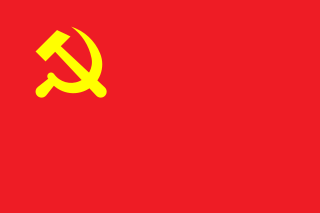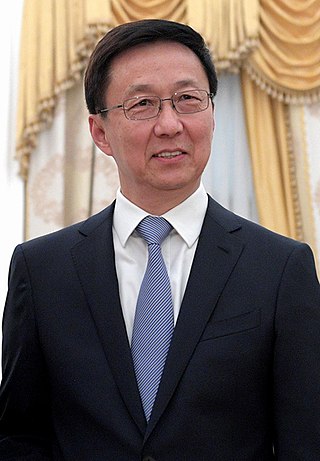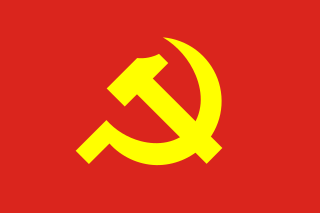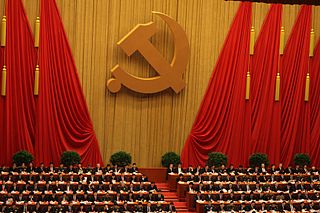Membership of the Politburo Standing Committee may refer to:

The Politburo of the Chinese Communist Party, formally known as the Political Bureau of the Central Committee of the Communist Party of China, is the decision-making body of the Central Committee of the Chinese Communist Party.

The Politburo Standing Committee (PSC), officially the Standing Committee of the Political Bureau of the Central Committee of the Communist Party of China, is a committee consisting of the top leadership of the Chinese Communist Party (CCP). Historically it has been composed of five to eleven members, and currently has seven members. Its officially mandated purpose is to conduct policy discussions and make decisions on major issues when the Politburo, a larger decision-making body, is not in session. According to the party's constitution, the General Secretary of the Central Committee must also be a member of the Politburo Standing Committee.

The General Secretary of the Central Committee of the Chinese Communist Party is the head of the Chinese Communist Party (CCP), the sole ruling party of the People's Republic of China (PRC). Since 1989, the CCP general secretary has been the paramount leader of the PRC.
The orders of precedence in China is the ranking of political leaders in China for the purposes of event protocol and to arrange the ordering of names in official news bulletins, both written and televised. It is also sometimes used to assess perceived level of political power. Although there is no formally published ranking, there is usually an established convention and protocol, and the relative positions of Chinese political figures can usually be deduced from the order in meetings and especially by the time and order in which figures are covered by the official media. Since 1982, the General Secretary of the Chinese Communist Party has been the highest ranking official in the People's Republic of China (PRC).
Generations of Chinese leadership is a term historians use to characterize distinct periods of the leadership of the Chinese Communist Party (CCP) and, by extension, successive changes in the ideology of the CCP. Historians have studied various periods in the development of the government of the People's Republic of China by reference to these "generations".

The National Congress of the Chinese Communist Party is a party congress that is held every five years. The National Congress is theoretically the highest body within the Chinese Communist Party (CCP). Since 1987 the National Congress has been held in the months of October or November. The venue for the event, beginning in 1956, is the Great Hall of the People in Beijing. The Congress is the public venue for top-level leadership changes in the CCP and the formal event for changes to the Party's Constitution. In the past two decades the National Congress of the CCP has been pivotal at least as a symbolic part of leadership changes, and therefore has gained international media attention.

The Central Committee of the Chinese Communist Party, officially the Central Committee of the Communist Party of China, is a political body that comprises the top leaders of the Chinese Communist Party (CCP). It is currently composed of 205 full members and 171 alternate members. Members are nominally elected once every five years by the National Congress of the Chinese Communist Party. In practice, the selection process is done privately, usually through consultation of the CCP's Politburo and its corresponding Standing Committee.

The Chairman of the Central Committee of the Chinese Communist Party was the leader of the Chinese Communist Party. The position was established at the 8th National Congress in 1945 and abolished at the 12th National Congress in 1982, being replaced by the general secretary. Offices with the name Chairman of the Central Executive Committee and Chairman of the Central Committee existed in 1922–1923 and 1928–1931, respectively.

Qian Qichen was a Chinese diplomat and politician. He served as Chinese Communist Party (CCP) Politburo member from 1992 to 2002, China's Foreign Minister from April 1988 to March 1998, and as Vice Premier from March 1993 to March 2003. Since then, no other diplomat-turned-politician has attained such a lofty status in China's political hierarchy. Qian played a critical role in shaping China's foreign policy during CCP general secretary Jiang Zemin's administration, and was a key player handling the return to Chinese sovereignty of Hong Kong and Macau. He was in charge of border negotiations with the Soviet Union in the 1980s, resulting in a successful settlement of the border dispute and the thawing of the relations between China and Russia. He was also instrumental in handling China's normalization of relations with the West in the difficult period after the Tiananmen Square protests of 1989.

Han Zheng is a Chinese politician serving as the current Vice President of the People's Republic of China since 2023. He previously served as Senior Vice Premier of the State Council from 2018. He has also been leader of the Central Leading Group on Hong Kong and Macau Affairs from April 2018. From 2017 to 2022, he served as a member of the Politburo Standing Committee of the Chinese Communist Party (CCP). Han served as Deputy Party Secretary and Mayor of Shanghai between 2003 and 2012. In November 2012, he was promoted to become the Party Secretary of Shanghai, the top political post in the city, and also gained a seat on the CCP Politburo. On March 10 2023, Han Zheng who left the politburo standing committee in 2022, became the vice president of China.

The Publicity Department of the Central Committee of the Communist Party of China, also known as the Propaganda Department or Central Propaganda Department, is an internal division of the Central Committee of the Chinese Communist Party (CCP) in charge of spreading its ideology, media regulation, as well as creation and dissemination of propaganda. The department is also one of the main entities that enforces media censorship and control in the People's Republic of China.

The General Secretary of the Central Committee of the Communist Party of Vietnam, known as First Secretary from 1951 to 1976, is the highest office within the Communist Party of Vietnam and the leader of Vietnam. The General Secretaryship was the second-highest office within the party when Hồ Chí Minh was Chairman, a post which existed from 1951 to 1969. The general secretary is also the Secretary of the Central Military Commission, the leading Party organ on military affairs. For much of its existence, the general secretary has been leader of Vietnam. The current general secretary is Nguyễn Phú Trọng, and he is ranked first in the Politburo.

The leader of the Central Committee of the Chinese Communist Party is the highest-ranking official and head of the Chinese Communist Party (CCP). Since 1982, the leader of the CCP is equivalent to the office of the General Secretary of the Central Committee. Since its formation in 1921, the leader's post has been titled as Secretary of the Central Bureau (1921–1922), Chairman, and General Secretary.

Yu Zhengsheng is a retired Chinese politician. Between 2013 and 2018, he served as the Chairman of the Chinese People's Political Consultative Conference (CPPCC), a largely ceremonial political advisory body. Between 2012 and 2017, Yu was a member of the Politburo Standing Committee of the Chinese Communist Party.
The 10th Politburo of the Chinese Communist Party was elected at the 1st Plenary Session of the 10th Central Committee on August 30, 1973, consisting of 21 members and 4 alternate members. There were additions to the membership in 1973 and 1977. It was informally supervised by the Politburo Standing Committee of the Chinese Communist Party. It was preceded by the 9th Politburo of the Chinese Communist Party.

The 18th National Congress of the Chinese Communist Party was held November 8-15, 2012 at the Great Hall of the People. It was preceded by the 17th National Congress of the Chinese Communist Party. Due to term and age limits restrictions, seven of the nine members of the powerful Politburo Standing Committee (PSC) retired during the Congress, including Hu Jintao, who was replaced by Xi Jinping as General Secretary of the Chinese Communist Party. The Congress elected the 18th Central Committee of the Chinese Communist Party, and saw the number of Politburo Standing Committee seats reduced from nine to seven. It was succeeded by the 19th National Congress of the Chinese Communist Party.

In North Korea, the Political Bureau of the Central Committee of the Workers' Party of Korea (WPK), or simply the Politburo, formerly the Political Committee (1946–61), is the highest decision-making body in the ruling party between sessions of its Central Committee. Article 25 of the Party Charter stipulates that "The Political Bureau of the Party Central Committee and its Standing Committee organize and direct all party work on behalf of the party Central Committee between plenary meetings. The Political Bureau of the Party Central Committee shall meet at least once every month." The Politburo is elected by the Central Committee of the Workers' Party of Korea.
The organization of the Chinese Communist Party (CCP) is based upon the Leninist idea of democratic centralism.
The 19th National Congress of the Chinese Communist Party was held at the Great Hall of the People, Beijing, between 18 and 24 October 2017. 2,280 delegates represented the party's estimated 89 million members. Preparations for the 19th National Congress began in 2016 and ended with a plenary session of the Central Committee a few days prior to the Congress. In 2016, local and provincial party organizations began electing delegates to the congress as well as receiving and amending party documents. It was succeeded by the 20th National Congress of the Chinese Communist Party.

The 19th Central Committee of the Chinese Communist Party was elected by the 19th National Congress in 2017, and sat until the next National Congress was convened in 2022. It formally succeeded the 18th Central Committee of the Chinese Communist Party and preceded the 20th Central Committee of the Chinese Communist Party.